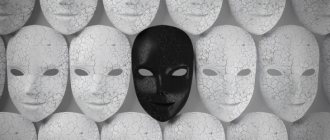Fear of the unknown is familiar to many people. It is this feeling that makes a person refuse to make changes in life, and increased anxiety leads to inaction. Of course, caution is necessary, but it is impossible to live in anticipation of unfavorable events and at the same time maintain peace of mind.
Being in a comfort zone, an individual always knows what awaits him in the future. When an established system fails, panic begins. When it comes to phobias, the intervention of a specialist can stop the destructive process. Psychiatrists also call agnosophobia an elusive fear.
What is fear of the unknown
Fear of the unknown is one of the common fears that haunt a person even in adulthood. Fear of the dark belongs to this phobia, since it is impossible to see what is happening in it. The brain turns on fantasy, and a variety of thoughts come to mind.
People are often frightened by the unknown of the future, which is why the services of clairvoyants and fortune-tellers are so popular. When an individual tries to control everything, he is in an anxious state. The fact is that control is only an action that distracts from anxiety. A clear plan provides motivation for action, but most people prefer to stay at the same level rather than take risks to achieve something greater.
Brief information about fear
In our comfort zone, we always know what to expect. When this system is disrupted, we begin to panic and fear that something will happen that will radically change our living conditions. Almost all people are pessimists, and therefore, when there is a possibility of changes in life, we think only about the bad.
Phobia of the unknown needs treatment. If this is not done, a person will stand in one place in matters of his financial, moral and aesthetic development. Let's consider how to suppress the fear of the unknown.
Causes
Fear of the unknown overtakes a person when he expects a significant event in life. These could be entrance exams, moving to a new job, or a long trip. Scientists say that the fear of new things is inherent in the body at the genetic level. The ancestors of people who lived on earth millions of years ago could not get rid of anxiety in the dark.
These creatures had no protection and often died due to the invasion of predators. But there is a difference between past fear and its present manifestation. Psychology has identified the following reasons for fear of the unknown:
- fear of being in trouble;
- lack of self-confidence;
- fear of losing everything you have.
Doctors recommended that people suffering from phobia undergo a brain examination. After analyzing the results, doctors saw that the patients had enlarged individual brain structures: the amygdala and the insular lobe of the organ. Similar changes were found in those who complained of symptoms of depression.
Who is most susceptible to agnosophobia?
In early childhood, the unknown does not frighten the child. During school, children still enjoy carelessness, but as they approach their senior year, a person is overcome by the fear of the unknown. He must make the right choice in order to build his future.
In an educational institution, there are two scenarios for the development of events: having learned the lesson, the student will receive a good grade, but for failure to complete the task, he will receive a negative mark. Adult life is more complicated; a lot can depend on the decision you make.
How to overcome the fear of the unknown
How to overcome fear of the unknown
In the early years, a person does not know the feeling of fear. When a child is still very small, crawling on all fours, he is not afraid of anything. Even if the child encounters an obstacle on his way, he confidently avoids it and continues to crawl. At this moment, the child does not pose questions that hinder his movement - “Where to crawl?”, “Why crawl?”, “What awaits me next?” – he just crawls, enjoying the process itself.
While studying in high school, even before entering adulthood, a person also mostly enjoys the process - making new pleasant acquaintances, studying new disciplines, helping younger people. Of course, a person already has a certain level of responsibility when he should study lessons in order to study well and get good grades. However, even then it is extremely clear to the person that there are only two scenarios for the development of events: if the lessons are learned, he will receive a good grade, and if the lessons are not learned, he will receive an unsatisfactory grade. The same is true for studying at university, with the only exception that classes are replaced by exams.
But now the carefree time of study passes, a time when a person, in order to achieve success, had to follow one intended path, when there was no need to make extraordinary and sometimes risky decisions, when a person could completely rely on the help of his parents in solving even the most difficult issue. In other words, real, adult life began. And then suddenly a person is overcome by fear: “What should I do next?” A person begins to fear - what if he now makes the wrong decision, and his whole life, everything that a person has achieved over the years, will collapse overnight. Fear fetters a person’s will, makes him mark time, not understanding his further actions. For a person, everything in adult life is new and unfamiliar, and therefore a person begins to draw pictures of failure in his imagination, when he will lose in a difficult struggle with difficulties, and only because in real life he has not even tried to win. Under the influence of fear of the unknown, a person is confident in his own failure, and therefore often prefers not to take any action at all to achieve success.
The most interesting thing is that, being a passive observer of the course of his own life, a person is afraid not of failure itself, but of the impossibility of determining the further development of events. In other words, it would be much easier for a person to know that he will fail than to be ignorant of the outcome. It is the inability to determine the outcome that is the main source of fear. When a person is afraid to remain in the dark, he is not afraid of the darkness itself, but of the possible threats that may threaten him in the dark.
Fear of the unknown can be caused by any events, the outcome of which a person is not able to predict with certainty, or which a person has not previously had to deal with. A striking example is finding a job after graduating from university. During his studies, a person had a class schedule, according to which he attended lectures and seminars, took notes, in order to successfully pass the exam. After university, a person did not have a schedule of where to move next; he had to assess his abilities and preferences himself, analyze the job market, send out a resume for open vacancies (having previously created this resume), undergo interviews and, if he made a favorable impression on the employer , the man got a job. Of course, each of the listed stages is accompanied by fear of the unknown, because at no stage can a person know exactly what awaits him ahead. Perhaps there are no open vacancies in his specialty in the city, or maybe his resume will be so unattractive that 99% of employers will throw it in the trash without even considering it (sounds cruel, but this is the truth of life, nothing can be done). And of course, the main fear grips a person during an interview, since this stage is the final stage before hiring, and therefore extremely important.
Under the influence of fear of the unknown, a person develops problems with appetite, a feeling of high blood pressure, body temperature rises and trembling begins, the person becomes absent-minded, and sleep disturbances occur. Of course, all these symptoms do not in any way increase a person’s chances of achieving success in any endeavor.
There is also one very important feature that distinguishes fear of the unknown from other types of fear - most of the fears are caused by real external factors that negatively affect a person and make him doubt his own capabilities. Fear of the unknown is most often caused by the results of human imagination. In other words, a person creates his own fears, and then he himself suffers from them. When these fears become too many, a person’s will is suppressed and the person becomes almost completely demoralized - he does not know where to go and what to do in each specific situation. Fear of the unknown, unlike other types of fear, is not based on a person’s life experience, and arises solely from his conjectures and judgments. What’s even worse is that the human consciousness is accustomed to giving everything unknown a negative connotation.
As soon as a person thinks about something unknown, he immediately draws negative pictures of the development of the situation in his own mind. Fear of the unknown is also dangerous because it not only prevents a person from effectively achieving his goals, but is also quite capable of causing the development of the disease.
Alas, modern man is programmed from birth by parents and society to see in the unknown only impending troubles. And only a few of us realize that most of the unknowns that modern people are so afraid of hide a lot of favorable opportunities. There are many examples of opportunity hiding behind the unknown, and there is no need to list all of them. It is enough to give the example of an investigator who faces the unknown every day, trying to solve complex crimes without delay. He could also give up in the face of the unknown, be afraid of the consequences of the wrong decisions he made, not sleep or eat, but he acts differently and continues the investigation no matter what. As a result, if the case is successfully solved, the investigator has a favorable opportunity to fulfill the crime detection plan for the quarter, as well as to be noted on the “Honor Board”.
Many people refuse to achieve their goals only because in order to achieve them they must take a path unknown to them, perform actions that they have not done before, commit actions the result of which is unknown, and therefore they are afraid, afraid of losing what they already have and what reached earlier. It is at the moment of making an important decision that a person should switch from the emotion of fear of the unknown to other, more pleasant emotions. However, sometimes the fear of the unknown is so strong that a person is simply unable to switch - fear simply paralyzes his will.
So, what can a person do to get rid of the feeling of fear of the unknown?
1. Logical analysis of the worst case scenario. When you are afraid of the unknown, you should imagine in detail each of the possible scenarios, and choose the option in which you will suffer the greatest losses. You may ask: “Why, because imagining the worst of the options in your mind will lead to increased fear?” This is not entirely true. In fact, when you clearly understand all possible outcomes, they will no longer be unknown to you, and the fear of the unknown for a given situation will be removed. In addition, most often a person’s fear of the unknown is not really justified, and therefore, knowing about the likely losses when making an important life decision, a person will discover that the consequences are not at all as catastrophic as he imagined, which will allow him to be more decisive, taking responsibility solution.
2. Break your fear down into several parts. It is much easier to overcome a small fear than a significant one. For a better understanding, pick up a broom and try to break it. That does not work? Then untie it and create 10 identical groups of rods. Now break each one in turn. Surely the rods will break easily. This broom is your fear, which you are trying to overcome “in a swoop”, the first time, without even first assessing its scale. And there is nothing surprising in the fact that you constantly fail. Try to divide your fear into several stages and go through them one by one - like in a computer game. So, if you are afraid to jump into the water from a 30-meter height, first cover a distance of 5 meters, then 10, 15, 25 meters. Each time you overcome new heights, your fear will disappear, and you will gain confidence that you can jump into the water from 30 meters. Every person is capable of doing this, but not everyone decides to do it because of fear of the unknown (“What if I crash?!”). Believe me, even the Olympic medalists in ski jumping were also afraid of jumping, but they did not stop at anything on the way to their goal.
3. Take action! A method for the bravest. Convince yourself that your fear of the unknown is nothing more than a defensive reaction to actions you have not taken before, and no matter what, continue to act in the chosen direction. When a person acts in this way, he thereby oversteps his established beliefs in life, which hold him back on the path to success. When a person's behavior goes against his existing principles, it inevitably causes discomfort. Therefore, when a person experiences discomfort, he will determine which belief is holding him back, and can replace the established belief by repeating actions that are opposite to it. Of course, this will require considerable willpower and character, but no one promised you that it would be easy. Step over your fear with confidence! Remember, when you make an important decision or take an action that goes against your beliefs, the longer you hesitate and procrastinate, the more the fear of the unknown consumes you, and the more difficult it is to overcome this fear later. No matter how scared you are, do what you think is right.
4. Urgently work on improving your self-esteem. Fear of the unknown can be overcome easily and confidently when a person believes in his own strength, that he is able to overcome any obstacles, even the most unexpected. To increase your self-confidence, follow these important tips:
- Don't be afraid to take the initiative. If the truth is not on your side, the maximum that threatens you is to be misunderstood by others. However, if your initiative is appropriate, you can get even more than you yourself could expect;
- Don't be overly critical of other people. None of us are perfect, and therefore you need to be more tolerant of other people's shortcomings. If you constantly criticize other people, it means that you admit that you yourself can be the object of criticism from others, which in turn does not have the best effect on your self-esteem;
- In the morning, get up in a cheerful mood, with full confidence that you don’t have any troubles today. If you are used to getting out of bed every morning with a feeling of doom, you will have to work on this. Try meditation techniques, affirmations and visualization. Every time you go to bed at night, tune in to a positive mood - this state will be transferred to you in the morning mood;
— Be more friendly with people, and they will reciprocate you. We live in the society of other people, and whether we like it or not, it is possible to maintain high self-esteem by maintaining connections with other people. Being a cold egoist, concentrating exclusively on his own desires and needs, a person will push other people away from himself, and then there can be no talk of any high self-esteem;
- Be sincere with other people, and, first of all, with yourself. If you think that your opinion deserves to be heard, feel free to say everything you think, both good and bad. If you say only what others want to hear, they will sooner or later realize that you are deceiving them and will stop trusting your opinion;
- Do things that bring you true pleasure. When a person does what he likes, he is more likely to achieve success, and even the smallest success significantly increases a person’s self-esteem;
— Make a list of your past achievements and refer to it often. These may not be significant achievements, but you will be absolutely sure that you did everything in your power to achieve this result. When you read your achievements again, close your eyes and once again feel all the emotions,
5. Analyze the real danger of the unknown. When you are afraid of not knowing what lies ahead, ask yourself: “What am I more afraid of - suffering losses due to a wrong decision or not achieving my own goals due to my own passivity?” If your choice is the second option, then you will be able to overcome your fear of the unknown in order to achieve your desired goal. If you choose the first answer, then you should make considerable efforts to overcome your fear of the unknown. The visualization method is very suitable for this. Close your eyes and mentally move into the future. Imagine yourself making an important decision and achieving success. At the same time, you make sure to carry out the actions for which you fear the most. When you easily and naturally cope with your fear in your thinking, it will be much easier for you to decide to make important decisions in reality. In addition, the successful development of events in a situation that worries you will be recorded on your subconscious level, and you will follow this successful model of behavior.
So, despite all your fears of the unknown, you should take the next step, and let the above recommendations help you with this.
Author: Anton Yasyr for the website therapy.by
Patterns of human behavior
Psychologists know what the fear of the unknown is called. Agnosophobia occurs in response to negative thoughts created by the person himself. If an individual from birth has such traits as anxiety and suspiciousness, then he is inclined to predict a negative outcome of events. Experts have identified 5 behavior patterns of people suffering from this phobia.
Planner
A planner is a person who has plans for the future. He does not tolerate the slightest violation, and any changes cause panic in such an individual. Psychologists recommend that planners sometimes introduce something new into their lives and thereby overcome the fear of the unknown.
Owner
The owner values reliability in everything. He has his own opinion about a successful life and what attributes should correspond to a high standard of living. But you cannot trust stereotypes, since happiness has its own characteristics for each person. It is important to experience new emotions in order to understand what an individual really likes.
Opportunist
Fear of the unknown was beneficial to ancient people, but today it is harmful. The opportunist tries to get used to living in constant fear. Psychologists advise getting out of your comfort zone towards new experiences and starting small: gaining new skills.
Defeatist
A person who is afraid to make the slightest mistake will be called a defeatist. He is unable to move forward, since he is already set up for an unfavorable outcome.
Maximalist
Agnosophobia leads the maximalist to the belief that he cannot do everything perfectly. Which means it’s not worth trying. It is also a form of fear of making mistakes.
Trust in life
The attitude towards the unknown is the attitude towards life in general. What will happen in a second is not known for certain. But when reading this text, you are not worried and do not seek to control the author and control his thoughts. You trust the unknown of each new line.
Trust in the script of life is trust in the invisible director, if you like - in the principles by which the plot of the play develops. Even if we are not aware of these principles, this should not frighten us, although the unconscious tends to throw up a lot of threats - from the most insignificant to the most fundamental.
Symptoms of agnosophobia
Fear of the unknown appears due to the anticipation of any event that worries a person. In this case, the following symptoms are observed:
- loss of appetite;
- fever and chills;
- absent-mindedness.
Fear of the unknown prevents a person from living and working. In severe cases, sleep disturbances and high blood pressure are also noted. Pathological fear of the unknown leads to the fact that a person constantly thinks about the negative outcome of the case.
We simultaneously want change and strive for stability
Human nature is extremely contradictory: on the one hand, we strive for progress because it brings with it new opportunities and improvements.
On the other hand, we subconsciously strive for stability; we may associate change with the abandonment of something time-tested and, therefore, obviously good in favor of something completely new and unknown. According to data published in the Journal of Experimental Social Psychology, people consider longevity to be the main criterion for good quality. In one experiment in the study, student participants preferred the old course schedule to the new one, without even assessing whether the updated version included fewer course hours. Simply because the original version seemed more familiar to them. And when they later heard that the old schedule had remained unchanged for hundreds of years, the students were even more confirmed in their opinion.
How to get rid of the fear of the unknown
Fear of the unknown destroys life, so you need to fight this phobia now. Don’t be afraid to ask a psychologist your question; popular articles will help you understand the causes of anxiety. The famous psychologist Chris Smith created several rules that can normalize your state of mind.
The first rule is called “here and now”. Its essence is to temporarily forget about worries, look around and become aware of what is happening around you. Slowly inhale and exhale the air. Take at least three of these breaks every day.
The important point should be recorded. Notes will help you draw conclusions at the end of the year. Don't neglect your relatives and friends, spend more time with those you care about. Plan your time correctly, learn to use it for the benefit of your work.
Three exercises from Christophe Andre
French psychotherapist Christophe Andre has repeatedly studied fear of the unknown. He came up with exercises that can help you overcome your phobia. The first technique is called “Reporter”, it is aimed at getting used to the changes occurring around a person. In your free time, go to an unfamiliar place in order to explore it and write a short report with photos.
The second exercise is called “Upside down.” Thanks to him, you will learn to love everything new. In the evening, create a daily routine, and in the morning do the opposite. The final exercise is called “Becoming a Follower.” Invite your friend or colleague to write a daily routine for you and try to follow all the points. This way you will learn to trust people.
The magic of a new day
Despite the predictability, each new day has potential that has not yet been actualized. The actualization of this potential depends not only on us - we play the role of a musical instrument in the hands of a master. The uncertainty of a new day is recreated through our lives.
That's why it's helpful to ask yourself important questions. What am I really afraid of when I'm afraid of the unknown? What do I expect from the unknown? Am I more afraid of the unknown or the known? Why, if nothing is clear yet, am I waiting for the negative? What or who do I trust more: myself or life? Is what really scares me relevant to this situation? What would I prefer: a world where everything is known, or one where nothing is known? What's the worst thing that can really happen? What will I start thinking about if I stop worrying about the unknown future?
With this approach, the unknown ceases to be something frightening and formless, but becomes life itself. If we learn to trust life, ourselves, our nature and consciousness, then we will stop being afraid of the unknown. No matter what the plot develops, no matter what happens in life, we will always have ourselves and this world.
Who is subject to this fear?
In childhood, a person knows little about such a feeling as fear of the unknown. A child who does not yet know how to walk is afraid of little. This is due to the lack of questions regarding further actions. While studying at school, the child mostly enjoys life carefree. Already in high school, fear of the unknown appears, when a teenager has to think about what choice to make in order to successfully build his future.
Both at school and at university, a person has two options: he learns the lesson and gets a good grade, or he doesn’t learn and gets an unsatisfactory one.
As a person enters adulthood, a new fear of the unknown appears. It happens that a person does not know what to do next. He is constantly accompanied by the fear of making the wrong decision, because his future life may depend on this decision.
Children are rarely afraid of the future
Create the right environment for yourself
Having people around you who approve and support your desire for change helps you move forward. This could be anyone: friends, a psychologist or a mentor. The latter will support you, discover your strengths together with you, form a new picture of the world, record results and achievements. It’s also good if you are surrounded by at least one person who has already achieved what you dream of. This way you will move towards your goals, inspired by his successes.
- What will happen in the worst case scenario?
______
Forewarned is forearmed. If a person thinks about the real consequences that threaten him in the worst case scenario and mentally plays them out and lives them, then his fear will decrease or disappear altogether, because instead of the hated unknown there will be a clear idea of what awaits him in the most unfavorable combination of circumstances. By the way, let a person not spare black colors when drawing his prospects. After all, the worse the expectations, the happier the person will be when everything ends well.
The best way to overcome almost any phobia is to look your fear in the eye. The same is true for fear of the unknown. While waiting, a person should do something useful: for example, if he is afraid of an exam, then it is better not to devote the remaining time to the phobia, but to devote it to preparing for the test. If a person trembles at the thought of applying for a job, then it is better for him to conduct a mental interview with himself. Try to discover your strengths and weaknesses in order to approach the conversation with your future superiors fully armed.
Fear of the unknown is no longer quite a phobia, although it can grow to its proportions. Excessive fear of the future indicates a person’s very low self-esteem, so if he falls into a stupor while expecting something, then he should think about self-improvement and developing his intellectual and spiritual level. And of course, as the great V.I. said. Lenin: “Study, study and study again.”
In the modern world, it is very important to be on the crest of the information wave, so self-education and the search for the necessary information come to the fore. You need to quickly react to external events, be reactive like mercury. But sometimes it is these endless and never-ending information flows that demoralize a person and depress him, making him fear every next day. And this is not surprising, given the general speed of the era; each of us is sometimes horrified by the scale of the world around us, which has become even more vast thanks to the Internet. But we should not allow ourselves to think about the size of the modern world too often, as this distracts us from our work on ourselves and the world around us.
Also read the article about fear of heights.
The material was prepared by Dilyara specifically for agydar.ru
Find what works for you
It is important to explore what motivates you personally to take action, because the conditions for change are different for everyone. For some, competition ignites, and for others, it suppresses; for others, drawing up a detailed plan helps; for others, it is more important to take the first step, and deal with the consequences later; for some, it is convenient to move quickly, and for others, slowly, gradually. adapting to changes. Take the time to get to know yourself well and the conditions of change that are comfortable for you. This can be done independently or with a specialist.
The Yandex.Workshop team believes: everyone can change their life, everyone can learn new things, everyone can start today. Even if it didn't work out before. The course programs are designed for anyone who wants to master an in-demand digital profession or skills from scratch and is willing to devote time and effort to this, and experienced mentors can guide and help overcome difficulties.
What to do to stop being afraid of unpredictable circumstances?
Psychology offers some practices that can help overcome fear of the future:
- To do “planned spontaneity” is to do something in precisely those ways that seem unpredictable and risky.
- Invite another person to plan something (for example, a trip) and do everything according to his plan, without knowing the entire plan in advance and without adjusting it.
- Think through an exaggeratedly negative scenario for a case that threatens failure, and see that it is unlikely, and other outcomes are not so terrible.
- Present your results that you consider imperfect, fearing condemnation, and see that there will be no sharp criticism, but only approval.
- “Tighten up” that area of life that seems unpredictable to you. For example, a person with a high professional level is not so afraid of sudden dismissal.
The more experience of successful spontaneity you accumulate, the less you will be afraid of the unknown.
Website www.sympaty.net – Beautiful and Successful. Author: Daria Blinova. Learn more about the site's authors.











